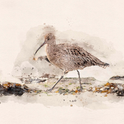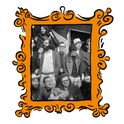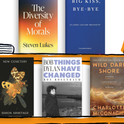Life Lessons from Nietzsche/Freud/Bergson/Byron/Kierkegaard/Hobbesby various authors (Macmillan, £6.99 each)
It is a sweet pleasure to sneer at self-help books and those who feel in need of them. What sad creatures they must be, we tell ourselves, as we picture them at home poring over the latest paperback solution to all life’s problems. Yet, as a moment’s reflection will show, every time we read a halfway serious book we are, whether we acknowledge it or not, helping ourselves to the fruits of the author’s hard work, his thoughts and discoveries, and in the process adding to our store of wisdom, making a small adjustment to our life’s course. There is no one who is not in need of a helping hand, and even the most curmudgeonly among us are not averse to winning friends and influencing people.
Alain de Botton has put up with many a jibe in his determination to bring enlightenment and aid to the masses. From a young age—and he is still only in his forties—he sought ways of wresting literature and philosophy from the jealous grasp of the academy and disseminating the pleasures and profits of them to as wide an audience as possible. To the surprise of those wiseacres who mocked him, that audience was found to exist. In his early twenties he published Essays in Love, which sold two million copies, and in 1997 he had another unlikely bestseller with How Proust Can Change Your Life.
His latest undertaking is the School of Life, founded in 2008, which operates from premises in central London. The organisation offers courses on how to deal with problems with work, relationships and the self, and is unapologetically bent on changing the world for the better. Among the programmes it runs is one in “bibliotherapy,” described as a “literary consultation service” by which people—one is tempted to write “patients”—can consult, for a fee, a “bibliotherapist” who will advise and direct them on which books and what sort of reading might address their particular needs and concerns. I know, it is hard to keep a straight face. Yet why not? Literature is a tonic, after all, and books contain the wisdom of the ages; no harm in unlocking some of it for general dispersal.
Now the School of Life has published, with Macmillan, six short handbooks of Life Lessons from great thinkers: Nietzsche, Freud, Bergson, Byron, Kierkegaard and Hobbes. They are hardly more than essays, bristling with quotations, and are thoroughly welcoming and approachable—see, for instance, John Armstrong’s note in the “Homework” section at the back of his volume on Nietzsche, in which he advises that one can practise pronouncing the philosopher’s name by “singing along” to a Youtube video; if you don’t feel like singing, Armstrong helpfully points out that “Nietzsche” rhymes nicely with “teach ya.”
At the head of each of the six volumes appears the following quote: “The School of Life is dedicated to exploring life’s big questions… We don’t have all the answers, but we will direct you towards a variety of useful ideas—from philosophy to literature, psychology to the visual arts—that are guaranteed to stimulate, provoke, nourish and console.” One cannot but admire the insouciance and optimism of the programme, and its lack of pretentiousness.
What is immediately striking about these six little books is the labour the authors have devoted to uncovering the positive aspects of each of their particular thinkers. On the face of it, Bergson and Byron would seem the only two out of the six who might have been expected to smile upon de Botton’s project. Yet as Armstrong reminds us, even Nietzsche, the would-be “Übermensch,” was bent upon improving the human lot, urging us “to think of history as a kind of therapy” and “to regard our lives as... precious.”
Similarly, Brett Kahr points out that Freud, whose essay Civilisation and its Discontents is a very dark pronouncement upon the human condition, could nonetheless note that “the man who first flung a word of abuse at his enemy instead of a spear was the founder of civilisation.” Kahr writes:
“Copernicus and Darwin, and most especially Freud, can help us to conquer our hubris and our self-importance by embracing our insignificance in the universe, and they can assist us to enjoy lives of greater modesty, with scope for more realistic achievement and less fantastic failure.”
In the same vein, Robert Ferguson, who has the thankless task of finding the soft and cuddly side of Kierkegaard, points out at the start of his book that “there is really only one thing Kierkegaard wants us to understand, and that is that most of us are sleepwalking our way through life.” Ferguson, wisely, does not try to throw a spurious light on to Kierkegaard’s darkness, and admits that there are many paths in Kierkegaard’s philosophy which he cannot follow. Yet he communicates strongly his enthusiasm, indeed his love, for this Manichean of the north, and writes of him, beautifully:
“I read him the same way as I swim in the sea, with no expectation of understanding the vastness of what I’m experiencing, but filled with gratitude and pleasure at being able to understand—and use—the little bit of it I do.”
If for nothing else, it is for this “gratitude and pleasure” which all six authors display, that one may treasure the series. Perhaps the finest, certainly the most exuberant, of the volumes is Michael Foley’s Life Lessons from Bergson. This philosopher was in his day a worldwide celebrity, and vast crowds of people of all intellectual hues crowded to hear his lectures. He won the Nobel Prize for literature in 1927, was a confidant of Woodrow Wilson and an enthusiastic backer of Wilson’s brainchild, the League of Nations; in 1917 the French government sent him secretly to Washington to help in persuading the Americans to enter the war on the side of the Allies.
In time, however, Bergson’s fabulous renown faded, when, as Ferguson writes, he was “rejected as an outdated establishment figure by the ambitious new boys like Sartre and Merleau-Ponty”—which is ironic, since in such declarations as “We are what we do,” Bergson had anticipated existentialism. Yet Bergson’s influence, especially on writers, was tremendous, and traces of his thought can be found, as Ferguson notes, in the work of TS Eliot, Proust, Virginia Woolf and, especially, Wallace Stevens.
In his book Ferguson gives us two for the price of one, by hauling in at every opportunity Bergson’s friend and admirer William James. This is some sort of justice, since, by rights, James, that great and ever-cheerful affirmer, should have been allotted one of these volumes to himself. He is a marvellous, wise and funny philosopher—who but he would have had the nerve and the originality to give drink its due? “Sobriety diminishes, discriminates and says no; drunkenness expands, unites and says yes.”
Bergson, and James, have much to teach us about the importance of breaking free of habituated thinking and the constrictions of hackneyed beliefs. Foley writes:
“All Bergson’s work was inspired by a conviction that life is petrified and diminished by theories, categories and conventions, and that it is the purpose of philosophy not to add yet more abstract reasoning but to restore awareness of lived life—to renew, revitalize and enrich direct contact with the world.”
That determination is there in spades in the work of Byron, and Matthew Bevis’s essay on a poet who was, as Caroline Lamb famously put it, “mad, bad and dangerous to know,” is a ringing affirmation of the power of poetry to reach down to the essence, or at least the essences, of life. Bevis opens with a candid reminder that Byron himself was not at all sure that books can provide life lessons: “Who was ever altered by a poem?” the poet asked, and answered himself with typical gaiety: “Reading or non-reading a book will never keep down a single petticoat.” And who would know better than this dedicated lifter-up of ladies’ undergarments?
Byron’s challenge brings us back to the essential question: is reading good for us, will it make us better, happier, more tolerant of others and of ourselves? Poetry, WH Auden dourly declared, makes nothing happen. He may be right, for we all know how Nazi camp commandants would divert themselves of an evening from the grim task of extermination by relaxing into the pages of Goethe and Schiller. Yet we cannot really say how a change in sensibility would occur, since its action would be so subtle, its accumulation so stealthily incremental. A poem will not stop a war, but who is to say it will not, and has not, stayed a warrior’s hand?
Hannah Dawson, in her invigorating essay on Hobbes, wonders why on earth, given the de Botton brief, she should have chosen to write on a philosopher who “seems to be both depressing cynic and totalitarian apologist.” Yet even such a leviathan, who believed that life is a war of all against all, has his moments in the light, and “we would do well to take note of his clear-eyed assessment of the psychological forces that pit us against one another, and the fact that, uncomfortable as it is, we need to be restrained.”
For all his dystopianism, Hobbes is one of those philosophers whom nowadays we find peculiarly congenial—even if we have not read him. Ours is a time of ferocity, and the more ferocious the tone the more weighty seems the voice that addresses us. Two world wars, and the many smaller wars that followed after them, have brutalised us and left us with the expectation that only the brutal can be authentic. Hence we swapped the gentler philosophers, such as Bergson and James, for Sartre, Wittgenstein and Adorno. But perhaps it is time to hearken again to their clear, pure and simple doctrines. Foley notes how much attention James paid to the act of attending, and how heartily Bergson agreed: “The more I think about the question,” Bergson wrote in a letter to James, “the more I am convinced that life is from one end to the other a phenomenon of attention.” These may not seem momentous observations, but they are. If the six books in the Life Lessons series can teach even a few readers to pay passionate heed to the world—to notice things—they will have been an unquestionable success.












